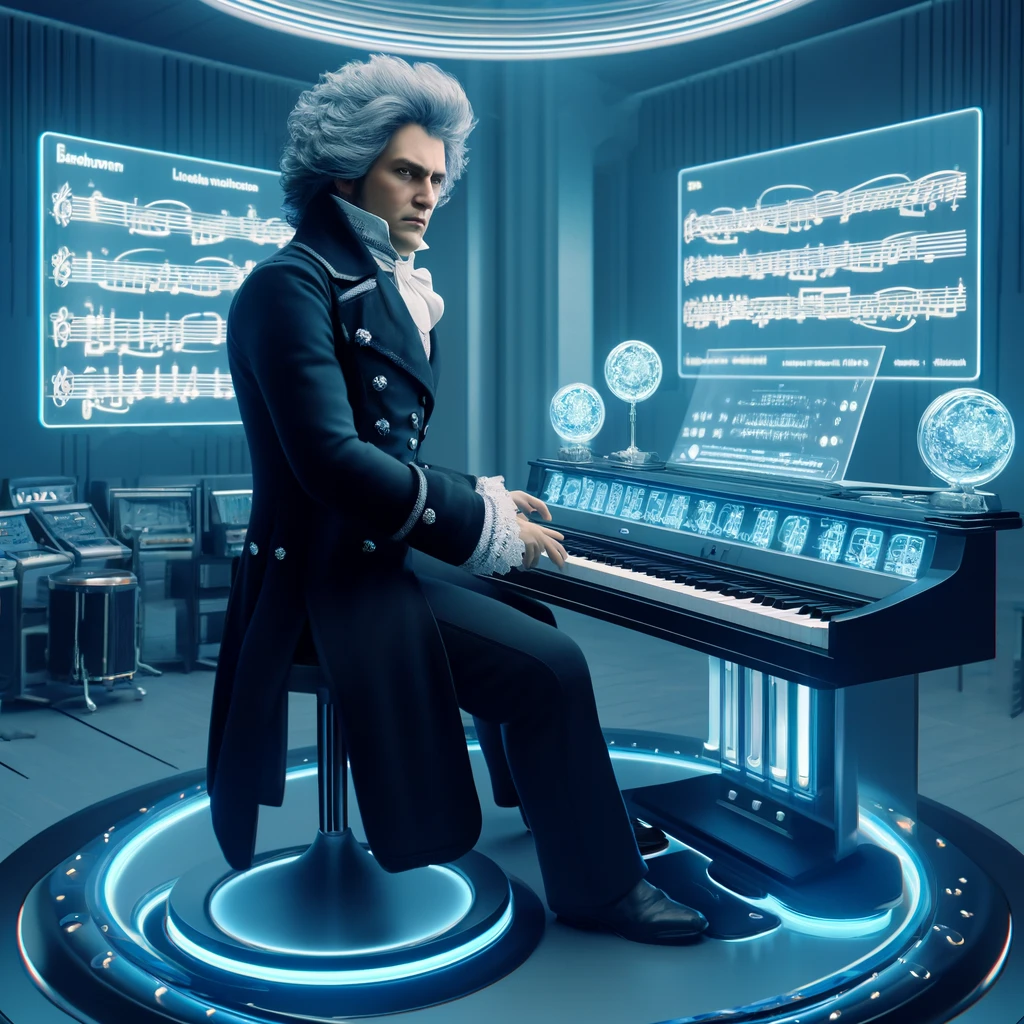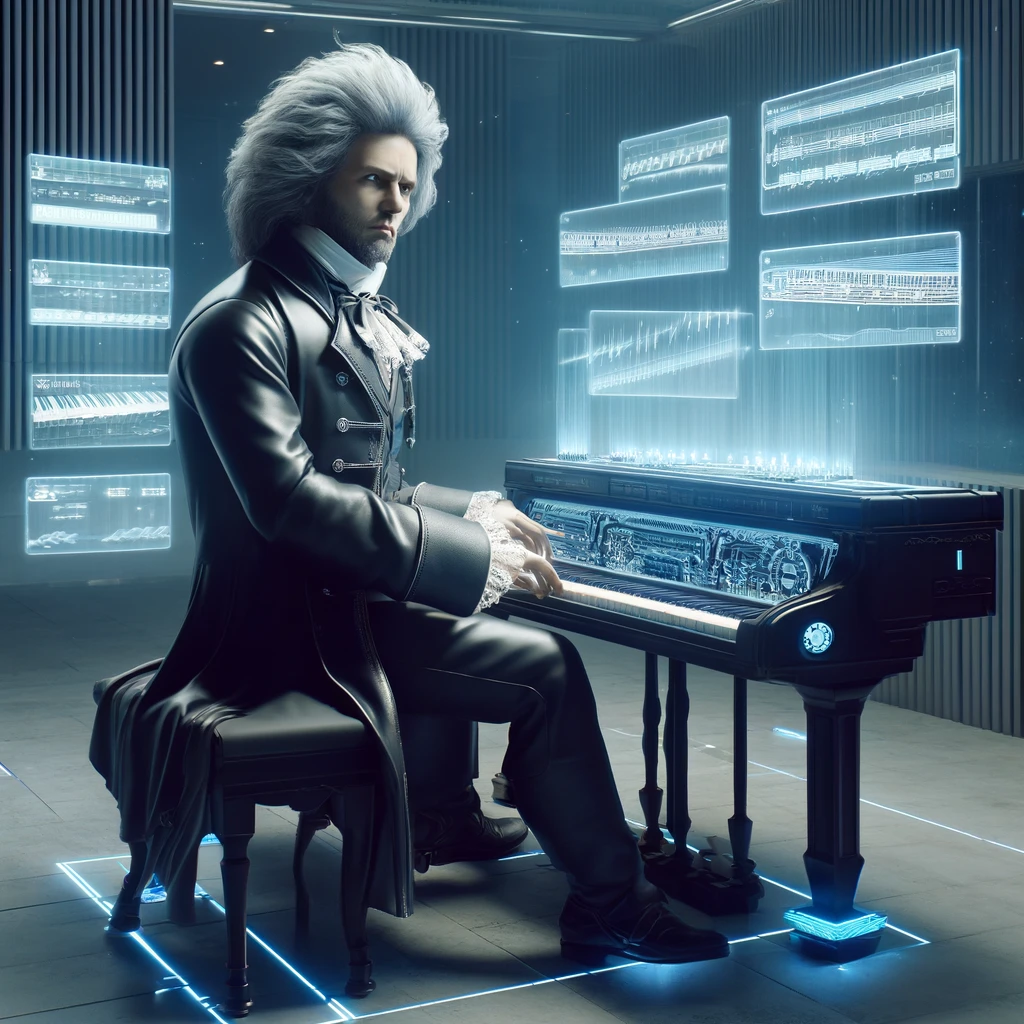
Beethoven’s Enduring Legacy in the Digital Era
Ludwig van Beethoven, a name synonymous with musical genius, continues to resonate through the centuries. While his life was set in the turn of the 19th century, his music voyages far beyond, finding new life and relevance in our digital era. This journey from sheet music to streams highlights not only Beethoven’s timeless appeal but also how technology has transformed the way we interact with his compositions.
Beethoven’s Inspirations
Beethoven’s music was revolutionary, fueled by a combination of personal experiences, the political climates of his time, and a profound depth of emotion. His inspirations were as varied as they were complex. From the heroic struggle against his progressive deafness to his passionate, often unrequited love affairs, each piece tells a part of his story. His political beliefs, particularly his initial support and subsequent disillusionment with Napoleon, spurred some of his most fiery works, including the famous “Eroica” Symphony.
Moreover, Beethoven drew inspiration from nature, which is vividly reflected in works like the “Pastoral” Symphony. This piece invites listeners to hear the serene beauty of the natural world, something that has universal appeal even today. Additionally, the influence of other composers, such as Mozart and Haydn, helped shape his early compositions. However, Beethoven soon forged a path distinctly his own, pushing the boundaries of music with his innovative structures and the emotional depth of his works.
Beethoven’s Influence on Music
The legacy of Beethoven is immense, shaping the foundations of Western classical music. His contributions to the symphony, sonata, and quartet are monumental, creating new structures and expanding the potential of musical expression. His Ninth Symphony, with its choral finale “Ode to Joy,” broke new ground by integrating vocals and symphony, setting a precedent for future composers like Wagner and Mahler.
Beethoven’s impact isn’t confined to classical music; his influence permeates various music genres, inspiring jazz, rock, and even pop musicians. His motifs and thematic developments introduced concepts that can be seen in the complex productions of modern music.
Streaming Beethoven
In today’s digital age, Beethoven’s works are more accessible than ever. Streaming services like Spotify and Apple Music offer extensive libraries of his compositions, performed by world-renowned orchestras. This accessibility allows people from all walks of life to experience Beethoven’s genius. Whether it’s through curated playlists or algorithm-based recommendations, these platforms are essential in keeping his music alive and relevant.
Moreover, the digital age has democratized music education. Apps like Simply Piano and websites like YouTube provide tutorials and performances, making it easier for novices to learn and appreciate Beethoven’s pieces. This has helped cultivate a new generation of enthusiasts, ensuring Beethoven’s place in a future where technology continues to break cultural boundaries.
Beethoven Apps and Virtual Reality
The intersection of technology and classical music extends beyond streaming. Several apps are dedicated to exploring Beethoven’s life and works in interactive ways. ‘Beethoven’s 9th Symphony’ app, for instance, allows users to engage with this monumental work through synchronized scores, expert commentary, and isolated instrument tracks.
Virtual reality (VR) takes this a step further by offering immersive experiences. Imagine standing in the center of an orchestra as it performs the “Fifth Symphony,” or walking through a virtual landscape inspired by the “Pastoral Symphony.” These experiences can transform our understanding and appreciation of Beethoven’s works, making classical music more experiential and engaging for the digital audience.
Social Media and Beethoven
Social media platforms also play a crucial role in the dissemination and appreciation of Beethoven’s music. From Facebook groups dedicated to classical music lovers to Instagram accounts that share snippets of his symphonies, these digital communities foster discussions and share knowledge among fans across the globe. Moreover, viral moments, such as flash mobs playing “Ode to Joy,” show how Beethoven’s music continues to inspire joy and unity.
Ludwig van Beethoven’s music has not merely survived; it has thrived, evolving continuously to meet the tastes and technologies of each new generation. As we continue to develop new ways of experiencing and sharing music, Beethoven remains at the heart of cultural conversations, proving that great music transcends time and technology.
Beethoven’s journey from the concert halls of Vienna to the digital screens of the 21st century illustrates not just the adaptability of his work but also our enduring need for art that challenges, comforts, and celebrates the human experience. In this digital age, Beethoven’s music remains a beacon of artistic brilliance, proving that some things are indeed timeless.

Educational Initiatives and Partnerships
One of the most exciting developments in the digital propagation of Beethoven’s music involves educational partnerships. Many symphony orchestras and educational institutions are collaborating to create programs and workshops that delve into Beethoven’s works, utilizing digital tools to reach a broader audience. For example, the Berlin Philharmonic’s Digital Concert Hall not only streams live performances but also offers educational resources that provide insights into Beethoven’s compositions, including masterclasses and documentaries. These resources are invaluable for students and educators alike, offering deep dives into the intricacies of his music and its historical context.
The Role of Artificial Intelligence
The integration of artificial intelligence (AI) in music has opened up new frontiers for exploring Beethoven’s compositions. AI-driven analysis can uncover patterns and nuances in Beethoven’s music that might not be immediately apparent even to trained musicians. For instance, researchers have used AI to complete Beethoven’s unfinished Tenth Symphony, providing a fascinating glimpse into what could have been if Beethoven had completed this work himself. Additionally, AI algorithms can personalize learning experiences in apps, adapting to the user’s pace and style of learning, which is particularly useful for those studying Beethoven’s complex compositions.
The Future of Beethoven in Digital Media
Looking ahead, the potential for new technologies to further enhance our experience of Beethoven’s music is vast. Augmented reality (AR) could allow us to see Beethoven’s scores come to life as we listen, highlighting themes and motifs as they occur, and providing real-time analysis of the music. This could dramatically change how we learn about and interact with classical music, making it more accessible and engaging than ever before.
Moreover, as spatial audio technology advances, listeners could experience the full spatial dynamics of a live Beethoven concert from their headphones. This technology can simulate how sound travels in a concert hall, providing a more immersive listening experience that closely mimics attending a live performance.
Challenges and Opportunities
Despite the enthusiasm for these digital advancements, there are challenges. Ensuring that these technologies enhance rather than detract from the musical experience requires careful curation and technological sensitivity. Moreover, there is the risk that digital formats may oversimplify or distort Beethoven’s works, potentially alienating traditional classical music audiences.
However, these challenges also present opportunities. By continuously refining these technologies, developers and musicians can create more refined and sophisticated tools that honor Beethoven’s legacy while introducing his works to those who might not otherwise have encountered them. The goal is not to replace the traditional listening experience but to augment it, providing more gateways through which people can discover the beauty of Beethoven’s music.
Conclusion
The digital age has not only preserved Beethoven’s legacy but has propelled it into the future with new vigor. Through streaming services, apps, VR, AI, and more, Beethoven’s music continues to inspire and influence across generations and geographies. As technology evolves, so too will the ways we engage with and understand this iconic composer. Beethoven’s music, characterized by its emotional depth and structural innovation, finds a new home in the digital world, promising endless possibilities for discovery and delight.
Beethoven once said, “To play without passion is inexcusable!” It seems the digital age has taken this to heart, ensuring his passionate music continues to resonate with humanity. As we look forward, Beethoven’s influence in digital and interactive media is not just about preservation—it’s about revolutionizing how we experience and think about music in the modern world.